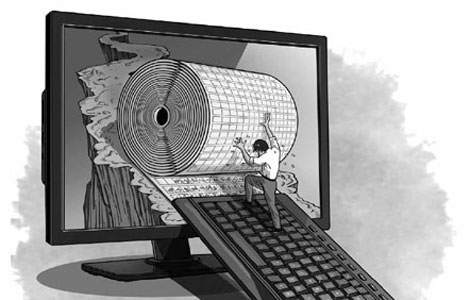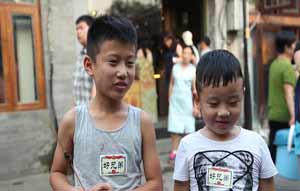Factories reopening after floods
Updated: 2013-10-14 23:59
By WANG ZHENGHUA in Shanghai (China Daily)
|
|||||||||||
Yuyao in Zhejiang province has largely recovered from its worst storm in a century that brought chaos to the industrial city last week.
The lives of hundreds of thousands of residents are back on track, with factories beginning to reopen on Monday.
The unprecedented flash flooding paralyzed public transport and telecom services and cut power and water supplies for days. The city's flood control headquarters said the level of the Yaojiang River dropped to 3.99 meters by 3 pm on Monday from its record 5.33 meters in recent days.
By early afternoon on Monday, only one out of the 151 inundated communities in downtown Yuyao remained partially flooded.
Transport authorities said two major roads remain closed, 66 out of the 75 bus routes have resumed operations, and more than 260 taxis out of the fleet of 440 are back on the road.
Power and water supplies have largely been restored.
To help thousands of migrant workers wanting to visit their hometowns after the disaster, the government offered free train or bus tickets to non-natives working in Yuyao.
From Monday until Oct 24, non-local residents holding temporary residence permits in Yuyao can apply for a free journey home.
On Monday, some factories resumed production. More are expected to reopen in coming days.
"We have started to work as usual," said Sun Wu, who works for Dafeng Industry, a supplier of stage, lighting and sound equipment. The factory, with 1,000 employees, along with most of the businesses in Yuyao, was forced to stop work during the flooding.
"Following the floods, we were worried about epidemics breaking out," Sun said on Monday. "But our factory organized disinfection work and we are relieved to be back at work."
Local authorities also helped clean and disinfect houses that were inundated by neck-deep floodwaters, he said. Many people who had to stay in temporary settlement centers or factory workshops have moved back into their homes.
Ye Chunyang, who works at Zettler Electronics, said: "We now have tap water and the power is expected to be restored soon. We are told to be back at work on Tuesday."
But Ye said workers' wages this month are expected to be low because of the impact of the flooding. "Our company's economic losses will not be small," he added.
After the flooding many people complained of below-par government relief efforts, saying the authorities had been slow or disorganized in providing help.
Teng Wuxiao, a disaster management expert at Fudan University in Shanghai, said: "The local government lacks plans to deal with disastrous weather. Without adequate preparation and an emergency plan, a city is likely to be paralyzed following such weather."
Many medium-sized or small cities are weak in analyzing and researching natural disasters, he said. "Lack of a sense of crisis and poor prevention and emergency management are often seen," he added.
In Yuyao, some residents approached by China Daily said they had not had access to food or proper accommodation for several days, although the local authorities said they had stocked enough provisions.
"The relief efforts were so disorganized that some got five or six quilts from the government while others, who received the news late, got none," said a resident in the village of Xinqiao, who asked to remain anonymous.
Mao Hongfang, Party chief of Yuyao, said the disaster was caused by unprecedented rainfall, denying there were improper drainage facilities in the city.
Mao said earlier it was only once in 100 years that a downpour with water volume equivalent to that of 68 West Lakes — the scenic spot in Hangzhou, the provincial capital — or to two years' rainfall in Beijing, fell on Yuyao in two days.
"Under the circumstances, the city's infrastructure, no matter how complete it is, is powerless. Even a god could not handle it."
Meanwhile, a town official in Yuyao was reprimanded after he was revealed to have asked a villager to carry him on his back to avoid getting his expensive shoes wet, China News Service reported on Monday. Harsher punishment is being considered, the report said.
Wang Hongyi in Shanghai contributed to this story.
wangzhenghua@chinadaily.com.cn
Related Stories
China issues yellow alert for waves 2013-10-14 21:28
Typhoon Nari approaches S.China's Hainan Province 2013-10-13 15:04
China starts emergency plans for Typhoon Nari 2013-10-13 02:52
Typhoon Fitow hits E China 2013-10-12 13:54
Shanghai, Zhejiang hit by downpours 2013-10-12 10:40
Many lend a hand in flood area 2013-10-12 07:20
Today's Top News
86 trapped at Mount Qomolangma camp amid snow
Senate leader 'confident' fiscal crisis can be averted
China's Sept CPI rose 3.1%
Li Peng's daughter denies 'rumors'
No new findings over Arafat's death: official
Working group to discuss sea issues
Nobel economists rarely get to influence policy
Trending news across China
Hot Topics
Lunar probe , China growth forecasts, Emission rules get tougher, China seen through 'colored lens', International board,
Editor's Picks

|

|

|

|

|

|





